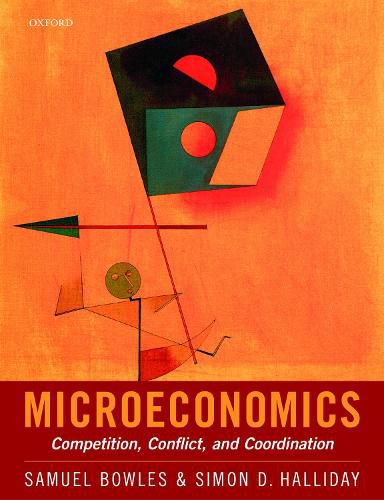Readings Newsletter
Become a Readings Member to make your shopping experience even easier.
Sign in or sign up for free!
You’re not far away from qualifying for FREE standard shipping within Australia
You’ve qualified for FREE standard shipping within Australia
The cart is loading…






Bowles and Halliday capture the intellectual excitement, analytical precision, and policy relevance of the new microeconomics that has emerged over the past decades.
Drawing on themes of the classical economists from Smith through Marx and 20th century writers - including Hayek, Coase, and Arrow - the authors use twenty-first century analytical methods to address enduring challenges in economics.
The subtitle of the work - Competition, conflict, and coordination - signals their focus on how the institutions of a modern capitalist economy work, introducing students to recent developments in the microeconomics of credit and labor markets with asymmetric information, a dynamic analysis of how firms compete going beyond price taking, as well as bargaining over the gains from exchange, social norms, and the exercise of power.
The new benchmark model proposed by Bowles and Halliday is based on an empirical approach to economic actors and problems. They start from the premise that contracts are incomplete, and that as a result market failures, rather than being a special case illustrated by environmental spillovers, are to be expected in markets for labor, credit, knowledge and throughout the economy. They explain how experiments show that human motivations include ethical as well as other-regarding preferences (rather than entirely self-interested) and explain why the technologies of knowledge-based economies are a source of winner-take-all rather than stable competition. The authors also consider the intrinsic limits of mechanism design and governmental interventions in the economy. Teaching recent developments in microeconomic theory allows the authors to provide students with the tools to analyze and engage in informed debate on the issues that concern them most: climate change, inequality, innovation, and epidemic spread. Tradeoffs are highlighted by providing models in which capitalism can be seen as an innovation machine that raises material living standards on average, while at the same time sustaining levels of inequality that many find to be unfair.
Digital formats and resources This title is available for students and institutions to purchase in a variety of formats and is supported by online resources.
For more information on e-books, visit: www.oxfordtextbooks.co.uk/ebooks/
Drawing on the authors’ decades of teaching the new microeconomics, this title is supported by a range of online resources for students and lecturers including multiple-choice-questions with instant feedback, further mathematical and discussion-based questions, a fully customizable test bank for lecturer use, PowerPoint slides to accompany each chapter, worksheets that can be assigned to the class, and answers to the problems set in the book.
$9.00 standard shipping within Australia
FREE standard shipping within Australia for orders over $100.00
Express & International shipping calculated at checkout
Bowles and Halliday capture the intellectual excitement, analytical precision, and policy relevance of the new microeconomics that has emerged over the past decades.
Drawing on themes of the classical economists from Smith through Marx and 20th century writers - including Hayek, Coase, and Arrow - the authors use twenty-first century analytical methods to address enduring challenges in economics.
The subtitle of the work - Competition, conflict, and coordination - signals their focus on how the institutions of a modern capitalist economy work, introducing students to recent developments in the microeconomics of credit and labor markets with asymmetric information, a dynamic analysis of how firms compete going beyond price taking, as well as bargaining over the gains from exchange, social norms, and the exercise of power.
The new benchmark model proposed by Bowles and Halliday is based on an empirical approach to economic actors and problems. They start from the premise that contracts are incomplete, and that as a result market failures, rather than being a special case illustrated by environmental spillovers, are to be expected in markets for labor, credit, knowledge and throughout the economy. They explain how experiments show that human motivations include ethical as well as other-regarding preferences (rather than entirely self-interested) and explain why the technologies of knowledge-based economies are a source of winner-take-all rather than stable competition. The authors also consider the intrinsic limits of mechanism design and governmental interventions in the economy. Teaching recent developments in microeconomic theory allows the authors to provide students with the tools to analyze and engage in informed debate on the issues that concern them most: climate change, inequality, innovation, and epidemic spread. Tradeoffs are highlighted by providing models in which capitalism can be seen as an innovation machine that raises material living standards on average, while at the same time sustaining levels of inequality that many find to be unfair.
Digital formats and resources This title is available for students and institutions to purchase in a variety of formats and is supported by online resources.
For more information on e-books, visit: www.oxfordtextbooks.co.uk/ebooks/
Drawing on the authors’ decades of teaching the new microeconomics, this title is supported by a range of online resources for students and lecturers including multiple-choice-questions with instant feedback, further mathematical and discussion-based questions, a fully customizable test bank for lecturer use, PowerPoint slides to accompany each chapter, worksheets that can be assigned to the class, and answers to the problems set in the book.